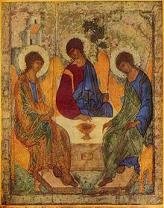 In the last issue, I began sharing the role that Athanasius played in helping the Church find the appropriate words to express its belief in Who Jesus Christ is. This led to a condemnation of the priest Arius who did not believe that Jesus was also God Himself. This all transpired at the Council of Nicea.
In the last issue, I began sharing the role that Athanasius played in helping the Church find the appropriate words to express its belief in Who Jesus Christ is. This led to a condemnation of the priest Arius who did not believe that Jesus was also God Himself. This all transpired at the Council of Nicea.
Some of the bishops present, although in complete disagreement with Arius, were reluctant to use a term (homoousios) not found in the Scriptures. Eventually they saw that the alternative was to have a creed that both sides would and could sign, each understanding it in its own way. They realized that the Church could not afford to leave the question of whether the Son is truly God (the Arians said “a god“) undecided. So the result was that the Council adopted a creed which is a shorter version of what we now call the Nicene Creed, declaring the Son to be of one substance with the Father. At the end, there were only two holdouts, the previously mentioned Secundus and Theonas.
No sooner was the council over than its consensus began to fall apart. Emperor Constantine had expected that the result would be unity, but found that the Arians would not accept the decision, and that many of the orthodox bishops were prepared to look for a wording a little softer than that of Nicea, something that sounded more orthodox but that the Arians would accept. All sorts of compromise formulas were worked out, with all shades of variation from the formula of Nicea. As you can see, the Church struggled to come to her understanding of who Jesus is.
In 328, Alexander died, and Athanasius succeeded him as bishop of the city of Alexandria. He refused to participate in these negotiations, suspecting (correctly as it turned out) that once the orthodox party showed a willingness to make reaching an agreement their highest priority, they would end up giving away the store. He defended the full deity of Christ against emperors, magistrates, bishops, and theologians. For this, he was regarded as a trouble-maker by Constantine and also his successors and was banished from Alexandria a total of five times by various emperors. (Hence the famous expression Athanasius against the world.”) Eventually, Christians who believed in the Deity of Christ came to see that once they were prepared to abandon the Nicene formulation, they were on a slippery slope that led to regarding the Logos as simply a high-ranking angel. Some things you just can’t compromise on.
